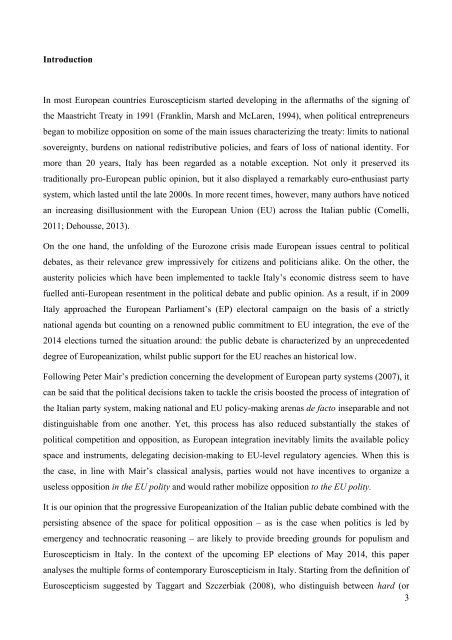IED-2014-Opposition-in-the-EU-and-opposition-to-the-EU-Pietro-Castelli-Gattinara-Caterina-Froio
IED-2014-Opposition-in-the-EU-and-opposition-to-the-EU-Pietro-Castelli-Gattinara-Caterina-Froio
IED-2014-Opposition-in-the-EU-and-opposition-to-the-EU-Pietro-Castelli-Gattinara-Caterina-Froio
You also want an ePaper? Increase the reach of your titles
YUMPU automatically turns print PDFs into web optimized ePapers that Google loves.
Introduction<br />
In most European countries Euroscepticism started develop<strong>in</strong>g <strong>in</strong> <strong>the</strong> aftermaths of <strong>the</strong> sign<strong>in</strong>g of<br />
<strong>the</strong> Maastricht Treaty <strong>in</strong> 1991 (Frankl<strong>in</strong>, Marsh <strong>and</strong> McLaren, 1994), when political entrepreneurs<br />
began <strong>to</strong> mobilize <strong>opposition</strong> on some of <strong>the</strong> ma<strong>in</strong> issues characteriz<strong>in</strong>g <strong>the</strong> treaty: limits <strong>to</strong> national<br />
sovereignty, burdens on national redistributive policies, <strong>and</strong> fears of loss of national identity. For<br />
more than 20 years, Italy has been regarded as a notable exception. Not only it preserved its<br />
traditionally pro-European public op<strong>in</strong>ion, but it also displayed a remarkably euro-enthusiast party<br />
system, which lasted until <strong>the</strong> late 2000s. In more recent times, however, many authors have noticed<br />
an <strong>in</strong>creas<strong>in</strong>g disillusionment with <strong>the</strong> European Union (<strong>EU</strong>) across <strong>the</strong> Italian public (Comelli,<br />
2011; Dehousse, 2013).<br />
On <strong>the</strong> one h<strong>and</strong>, <strong>the</strong> unfold<strong>in</strong>g of <strong>the</strong> Eurozone crisis made European issues central <strong>to</strong> political<br />
debates, as <strong>the</strong>ir relevance grew impressively for citizens <strong>and</strong> politicians alike. On <strong>the</strong> o<strong>the</strong>r, <strong>the</strong><br />
austerity policies which have been implemented <strong>to</strong> tackle Italy’s economic distress seem <strong>to</strong> have<br />
fuelled anti-European resentment <strong>in</strong> <strong>the</strong> political debate <strong>and</strong> public op<strong>in</strong>ion. As a result, if <strong>in</strong> 2009<br />
Italy approached <strong>the</strong> European Parliament’s (EP) elec<strong>to</strong>ral campaign on <strong>the</strong> basis of a strictly<br />
national agenda but count<strong>in</strong>g on a renowned public commitment <strong>to</strong> <strong>EU</strong> <strong>in</strong>tegration, <strong>the</strong> eve of <strong>the</strong><br />
<strong>2014</strong> elections turned <strong>the</strong> situation around: <strong>the</strong> public debate is characterized by an unprecedented<br />
degree of Europeanization, whilst public support for <strong>the</strong> <strong>EU</strong> reaches an his<strong>to</strong>rical low.<br />
Follow<strong>in</strong>g Peter Mair’s prediction concern<strong>in</strong>g <strong>the</strong> development of European party systems (2007), it<br />
can be said that <strong>the</strong> political decisions taken <strong>to</strong> tackle <strong>the</strong> crisis boosted <strong>the</strong> process of <strong>in</strong>tegration of<br />
<strong>the</strong> Italian party system, mak<strong>in</strong>g national <strong>and</strong> <strong>EU</strong> policy-mak<strong>in</strong>g arenas de fac<strong>to</strong> <strong>in</strong>separable <strong>and</strong> not<br />
dist<strong>in</strong>guishable from one ano<strong>the</strong>r. Yet, this process has also reduced substantially <strong>the</strong> stakes of<br />
political competition <strong>and</strong> <strong>opposition</strong>, as European <strong>in</strong>tegration <strong>in</strong>evitably limits <strong>the</strong> available policy<br />
space <strong>and</strong> <strong>in</strong>struments, delegat<strong>in</strong>g decision-mak<strong>in</strong>g <strong>to</strong> <strong>EU</strong>-level regula<strong>to</strong>ry agencies. When this is<br />
<strong>the</strong> case, <strong>in</strong> l<strong>in</strong>e with Mair’s classical analysis, parties would not have <strong>in</strong>centives <strong>to</strong> organize a<br />
useless <strong>opposition</strong> <strong>in</strong> <strong>the</strong> <strong>EU</strong> polity <strong>and</strong> would ra<strong>the</strong>r mobilize <strong>opposition</strong> <strong>to</strong> <strong>the</strong> <strong>EU</strong> polity.<br />
It is our op<strong>in</strong>ion that <strong>the</strong> progressive Europeanization of <strong>the</strong> Italian public debate comb<strong>in</strong>ed with <strong>the</strong><br />
persist<strong>in</strong>g absence of <strong>the</strong> space for political <strong>opposition</strong> – as is <strong>the</strong> case when politics is led by<br />
emergency <strong>and</strong> technocratic reason<strong>in</strong>g – are likely <strong>to</strong> provide breed<strong>in</strong>g grounds for populism <strong>and</strong><br />
Euroscepticism <strong>in</strong> Italy. In <strong>the</strong> context of <strong>the</strong> upcom<strong>in</strong>g EP elections of May <strong>2014</strong>, this paper<br />
analyses <strong>the</strong> multiple forms of contemporary Euroscepticism <strong>in</strong> Italy. Start<strong>in</strong>g from <strong>the</strong> def<strong>in</strong>ition of<br />
Euroscepticism suggested by Taggart <strong>and</strong> Szczerbiak (2008), who dist<strong>in</strong>guish between hard (or<br />
3
















